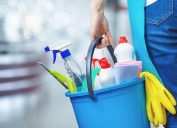5 Common Cleaning Products That Could Be Hurting Your Health, Experts Say
What you're using to scrub or spray germs away could be a health hazard.
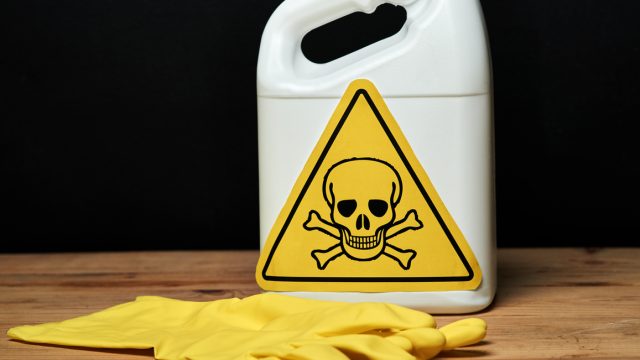
Keeping our homes clean has always been important, but for many of us, the COVID-19 pandemic kicked off a new standard of cleanliness. According to survey data shared by the American Cleaning Institute (ACI), the use of products like hand sanitizer and disinfectant wipes soared starting in 2020. That's not surprising, but what may be more so is that 85 percent of survey participants said they were "very or somewhat likely to maintain the same level of cleaning practices initially adopted in March 2020, even when the pandemic has passed."
Staying vigilant against bacteria and germs may help us stay healthy—but in the fight against infection, it's essential to be aware that some cleaning products may do more harm than good.
"Many household cleaning products contain chemicals that are actually harmful to our health," warns Lily Cameron, a cleaning supervisor at UK-based Fantastic Services. "They can release volatile organic compounds (VOCs), irritate your eyes and throat, and cause headaches and even more severe health problems. This includes products labeled 'green' or 'natural.'" Cameron adds that "Many of them pose an even more serious danger because they're flammable and corrosive."
Read on to find out what the experts say about which products to use with caution, and which ones to avoid altogether.
READ THIS NEXT: Never Use These Two Cleaning Supplies Together, CDC Warns.
1
Ammonia
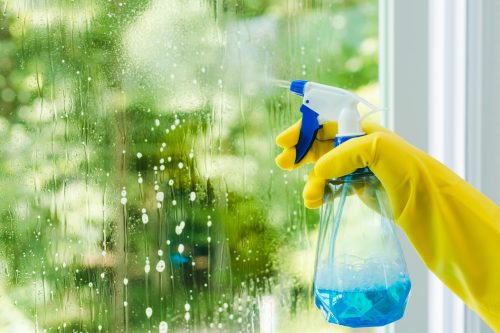
The dangers of products containing ammonia (such as Windex) are twofold. "[Ammonia] can irritate the eyes, nose, and throat," cautions Matthew Baratta, VP of Operations at the commercial and industrial cleaning equipment company Daimer Industries.
Baratta also notes that ammonia is "a known carcinogen, which means that if you experience repeated, long-term exposures to this product, there is an increased chance of cancer, or damage to the liver and kidneys." He suggests using an eco-friendly product that doesn't contain ammonia, or making your own with one part vinegar and one part water spray solution.
2
Products containing MEA, DEA or TEA
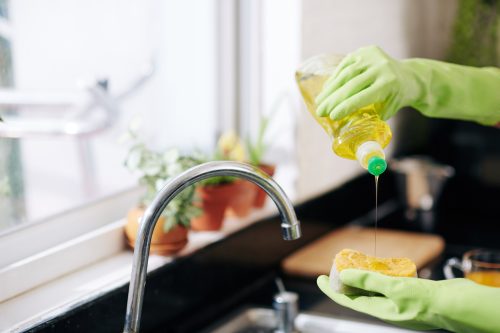
"It's important to read the labels of cleaning products and follow instructions carefully to avoid any potential health hazards," notes Ergo Sooru, co-founder and CEO of telehealth company DrHouse.
Steve Evans, owner of house cleaning service Memphis Maids, calls out three specific ingredients to watch for: "Pay attention to products that contain MEA (monoethanalomine), DEA (diethanolamine), or TEA(triethanolamine)," he advises. "They can increase risk for cancer and are found in many cleaning products including dish soap, liquid laundry detergent, and floor cleaners."
3
Drain cleaners
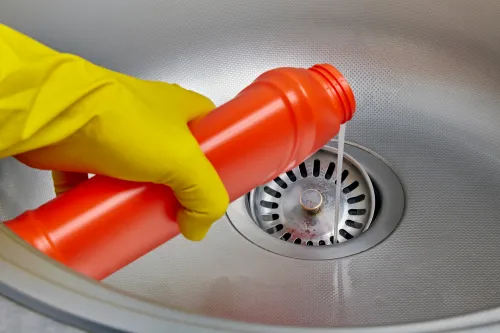
Cameron warns that drain cleaners—specifically those that contain ingredients such as sulfuric acid or sodium hydroxide—can be extremely dangerous.
"[These] harsh chemicals can cause burns on your skin and respiratory issues if their fumes are inhaled. Instead, use a plunger or a natural cleaning method, such as baking soda and vinegar," she suggests.
For more health news sent directly to your inbox, sign up for our daily newsletter.
4
Bleach
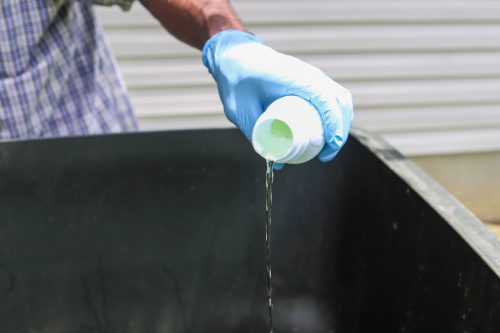
"Bleach kills bacteria, germs, and viruses, which is why it's found in so many common household cleaners, like toilet bowl cleaners, laundry detergent, and dishwasher detergent," Baratta explains. "However, bleach is very strong, and direct exposure to it can cause burning and irritation to your skin and eyes, or respiratory problems and lung damage if there is a high bleach concentration in the air."
Baratta suggests wearing protective gear such as gloves and a mask if you do choose to use bleach, and urges folks to limit their exposure as much as possible. "You can also opt to use alternative cleaning solutions, like vinegar, baking soda, or castile soap," he says.
5
Antibacterial products
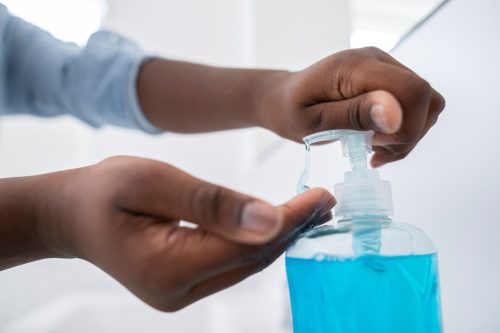
Many of us have adopted hand sanitizer as a mainstay in the fight against COVID and other viruses. But many antibacterial products "contain chemicals that can be harmful to your health and can lead to the development of antibiotic-resistant bacteria," warns Cameron.
"Before using an antibacterial cleaner, check the label for triclosan, which is a common antibacterial ingredient that's harmful," he says.


